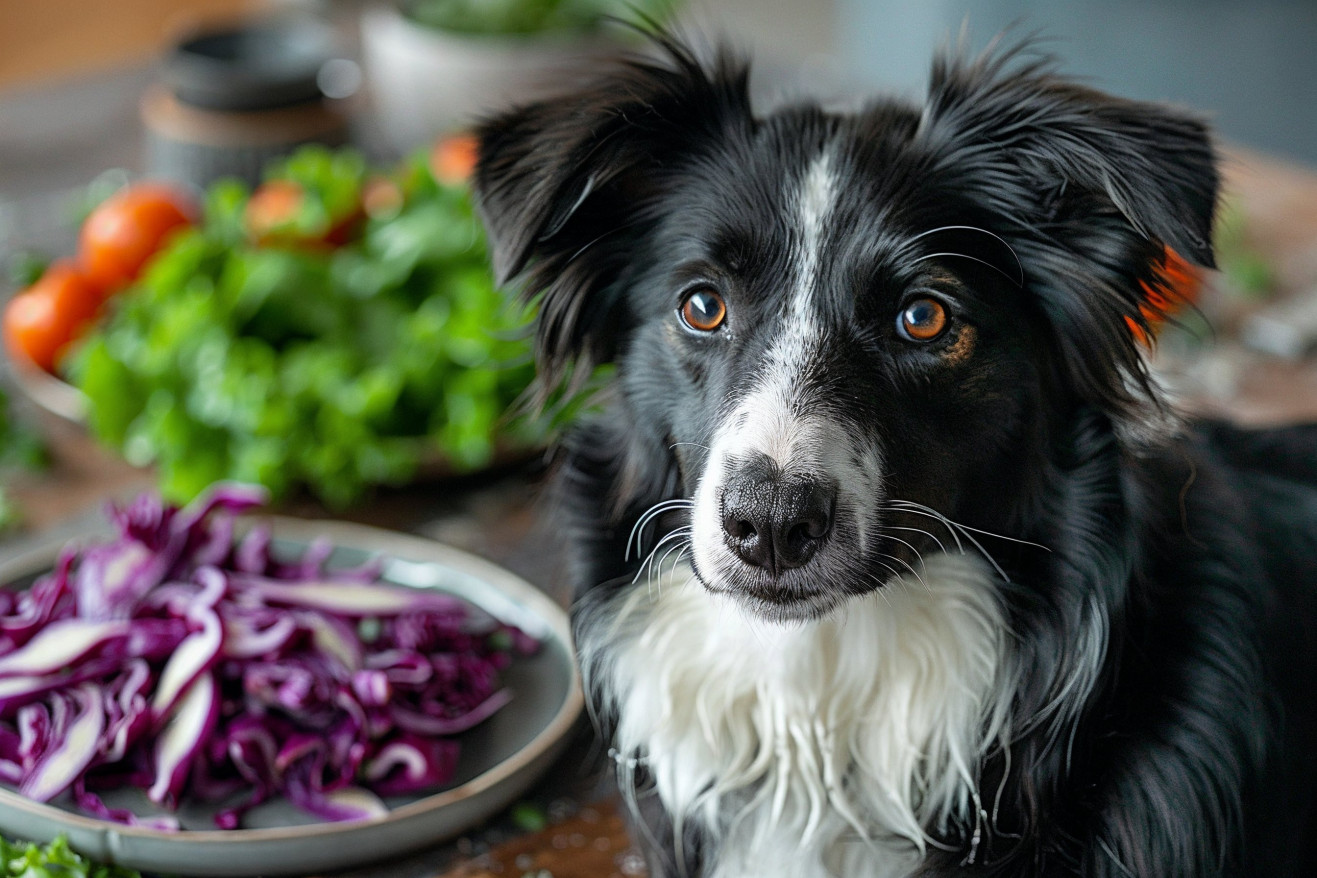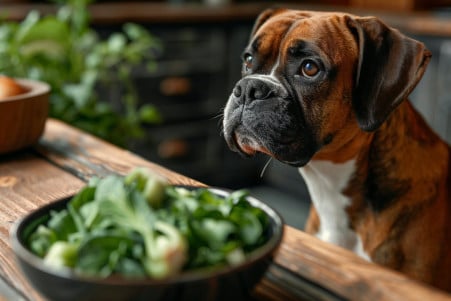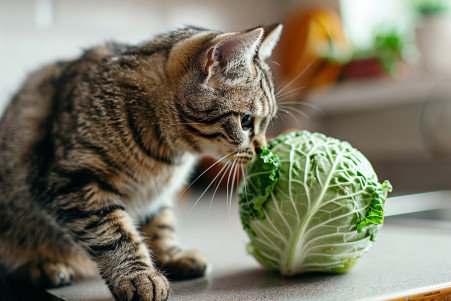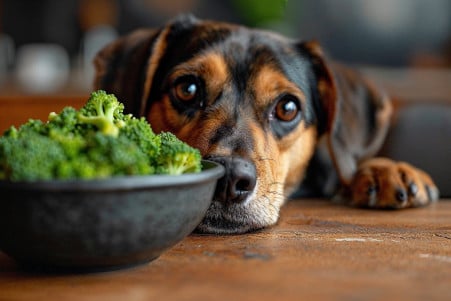Can Dogs Eat Red Cabbage? Benefits and Precautions Explained
3 April 2024 • Updated 2 April 2024

As more and more people seek out healthy vegetables to add to their dog's diet, it's natural to wonder whether red cabbage is a good option. The good news is that red cabbage is safe for dogs to eat in moderation as long as it's cooked and free of any seasonings, oils, or other ingredients that could be harmful to dogs. Although it's not something that dogs need to eat, red cabbage can be a good source of vitamins, fiber, and antioxidants if it's offered to dogs as an occasional treat and prepared properly.
This article takes a deep dive into the work of veterinary nutritionists and other experts in pet nutrition to help you understand the potential benefits and risks of feeding red cabbage to your dog. These experts will help you understand the nutrients in red cabbage, how much you should feed your dog, and any other concerns you should be aware of before you start feeding your dog this vegetable. By the end of the article, you'll have a good idea of whether or not you should add red cabbage to your dog's diet.
Can dogs eat red cabbage?
Nutritional Benefits of Red Cabbage for Dogs
Red cabbage is a nutritional powerhouse that can offer a number of health advantages for dogs in the right quantities. As noted by The Dog People by Rover.com, it's a good source of fiber, as well as vitamins K and C, which are important for disease prevention and digestive and immune system health.
Per Whole Dog Journal, red cabbage is rich in vitamins and minerals, including vitamin C, vitamin K, potassium, magnesium, and beta-carotene (a precursor of vitamin A), and antioxidants. Its fiber content can be helpful for constipation and diarrhea, which can be good for overall gut health.
FiFi Beaumont's adds that red cabbage is a great source of minerals, such as calcium, manganese, and potassium, which are important for bone health, growth, the nervous system, and energy production. Its anthocyanin antioxidant may help lower the risk of cancer, osteoporosis, and heart disease.
The vitamin K in red cabbage, which is also noted by several other sources, is especially important for blood clotting and bone health in dogs. Despite its nutritional benefits, it's important to use caution when introducing this cruciferous vegetable to avoid potential problems with overconsumption. That said, given its impressive nutritional content, red cabbage can be a helpful addition to a dog's diet when it's prepared and served properly.
How to Safely Feed Your Dog Red Cabbage
Cooked red cabbage is generally easier for dogs to eat and digest than raw cabbage, according to BeChewy. However, regardless of how you plan to serve it, you should always remove any tough stems and outer leaves before cooking or feeding it to your dog. And, as Four Leaf Rover points out, make sure not to add any seasonings, oils, or other ingredients that could be toxic to dogs.
To be safe, when you first feed your dog red cabbage, start with a small amount, such as 1 teaspoon for small dogs and a couple of tablespoons for large dogs, and watch for any signs of digestive upset, says BeChewy. If your dog doesn't have any issues, you can increase the amount you feed them, but make sure to do so gradually and always in moderation as part of a balanced diet, according to The Canine Nutritionist.
In conclusion, it’s important to prepare and feed your dog red cabbage properly and in moderation. If you do, you can help ensure that your furry friend can enjoy the potential health benefits of this nutritious veggie without any negative side effects.
Potential Risks and Side Effects
As mentioned by Dogs Naturally, red cabbage can cause digestive problems like gas, bloating, and constipation in some dogs. Red cabbage also contains goitrogens, which can interfere with thyroid function if consumed in large amounts over a long period, according to The Native Pet.
Dogs with hypothyroidism or other thyroid issues should avoid or only eat red cabbage in moderation, according to ManyPets. As the research also notes, introducing red cabbage too quickly or in large amounts can lead to stomach issues or discomfort.
In addition, dogs that are prone to urinary stones or bladder problems may need to avoid or only eat red cabbage in moderation because of its high oxalate content. It’s important to introduce red cabbage gradually and in moderation to avoid any potential negative side effects when feeding it to dogs.
How to Feed Red Cabbage to Your Dog
If you want to feed red cabbage to your dog, it's best to start with small amounts, like a teaspoon or two mixed in with your dog's regular food, according to My Pet Sensitivity. Make sure to watch your dog closely for any reactions and keep an eye out for any signs of digestive upset.
If your dog seems to do well with the red cabbage, you can gradually increase the amount you give them, but it's important to always feed it to them in moderation, according to MasterClass. It's also important to talk to your vet before giving your dog red cabbage, especially if your dog has any health issues or food sensitivities, according to The Dodo.
Instead of feeding red cabbage to your dog every day, it may be best to think of it as a special treat or supplement, based on the available evidence. This will help make sure that your dog can benefit from the nutrients in this superfood without experiencing any negative side effects from eating too much of it.
Other Vegetables to Feed Your Dog
In addition to red cabbage, there are other vegetables that you can feed your dog that are also nutritious. According to the American Kennel Club, green beans, carrots, sweet potatoes, and spinach are all safe and healthy vegetables to feed your dog.
It’s important to feed your dog a variety of vegetables to make sure they get a range of nutrients. As Modern Dog Magazine explains, while cabbage is high in antioxidants and can help with digestion, other vegetables like green beans and carrots have their own health benefits.
No matter which vegetable you choose, make sure to prepare it properly and feed it to your dog in moderation. According to Daily Paws, it’s important to talk to your vet or a pet nutritionist before adding new foods to your dog’s diet to make sure you’re meeting their specific nutritional needs.
Conclusion: Use Caution and Keep an Eye on Your Dog
Red cabbage can be a healthy and safe addition to your dog's diet if it's fed in moderation and prepared properly. However, it's important to start slowly and watch for any signs of digestive upset or other negative side effects. Make sure to talk to a vet, especially if your dog has any underlying health issues or allergies, before giving your dog red cabbage.
Even though red cabbage has some potential health benefits, it's best to think of it as an occasional addition to your dog's diet instead of a regular part of their meals. As with humans, dogs need a balanced diet that includes a variety of nutrients, and red cabbage should be just one part of a well-rounded, healthy meal plan.


